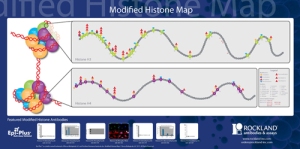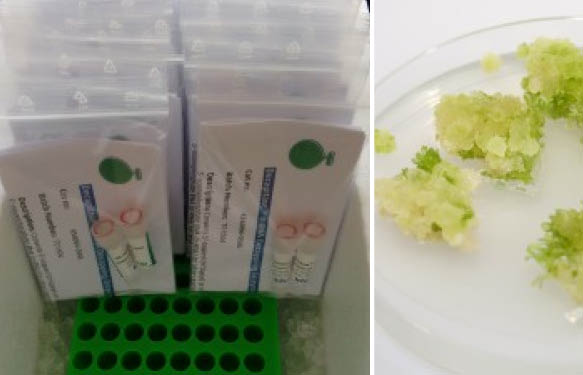The nucleosome core particle is the fundamental structural unit of the eukaryotic genome. It consists of a histone octamer composed of two H2A-H2B dimers and a H3-H4 tetramer wrapped by ~146 base pairs of DNA. A linker histone (i.e., H1) associates with the nucleosomal dyad as well as with linker DNA on either side of the nucleosome, resulting in the formation of the chromatosome. All the core and linker histones are posttranslationally decorated, with at least 160 total modifications described to date including acetylation, methylation, phosphorylation, propionylation, citrullination, formylation, proline isomerization, butyrylation, ADP ribosylation, ubiquitylation, sumoylation, and the more recently identified glycosylation and crotonylation.
These modifications are thought to impact chromatin functions by either altering chromatin packaging or through the recruitment/inhibition of specific chromatin binding factors. Thus, the combined signal from a particular collection of histone marks constitutes a “histone code” that affects gene expression or other chromatin-based functions.
Epigenetics research focuses primarily on histones and other proteins that control the regulation of gene expression, transcription, and protein-protein interaction. Epigenetic processes are implicated in an array of human pathophysiological conditions that include cancer, obesity, diabetes, drug addiction, and post-traumatic stress disorder. The pattern of histone modification functions to coordinate the binding of repressors, activators, and other proteins working together in a concerted fashion.
Antibodies have been extensively used for research in Epigenetics, but not all antibodies are the same. When you choose your antibody for this area of research, make sure to follow these tips…

Tip #1 – It all starts with the peptides
The quality of the peptide and of the epigenetic building blocks are critical to the production of high quality epigenetic antibodies. Some manufacturers utilise amino acid building blocks of inferior quality, resulting in contamination of the final peptide immunogen with other methylated forms. It is recommended to use the highest quality peptide immunogens possible.
Tip #2 – Proper QC during antibody production
It is important that antibodies used for Epigenetics studies are validated in multiple types of assays, including ChIP.
Tip #3 – Antibody specificity vs intended application

When choosing an antibody for your intended application, the specificity of the antibody versus its sensitivity can be of paramount importance. It is important to obtain an antibody with the most specific profile possible, and if possible, datasheets should include images of blots performed to check specificity of the antibodies for one given histone modification, and not others.
tebu-bio offers one of the best selections in Europe for Epigenetics antibodies, coming from different suppliers, in order to meet the strict requirements of researchers in this area (as in all research areas!).
Last but not least, if you are working on Epigenetics, you may be interested in receiving a poster on histone modifications? Leave your request in the comments below to receive your copy!



